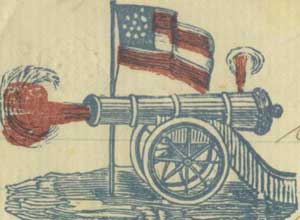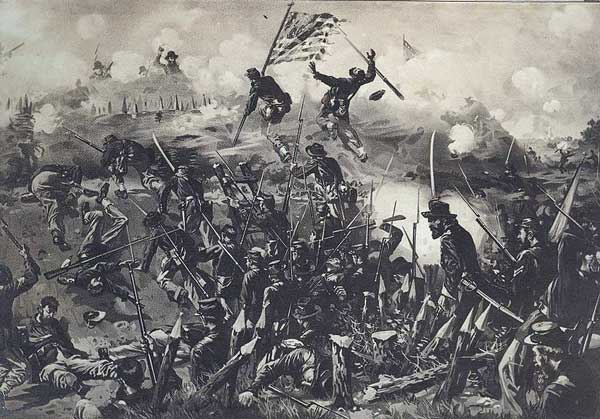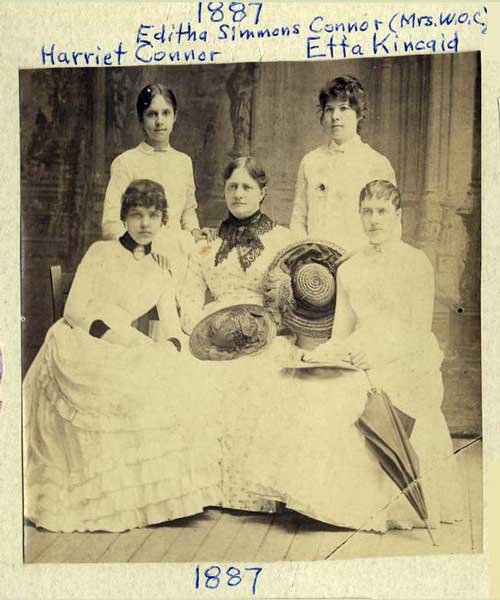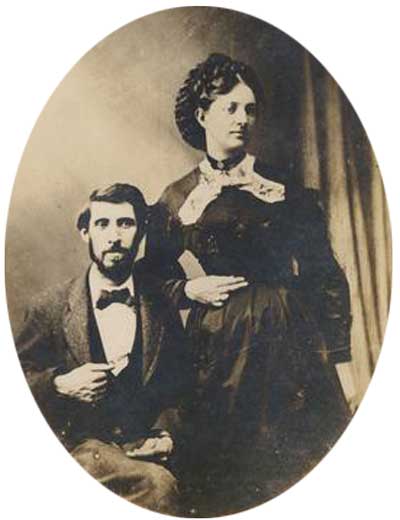|
Lieut. M. C. Leak - "Shiloh Letter" Written from Edwards, Mississippi By Sue Burns Moore (Letter, diary entries and family photos courtesy of Margaret Hollingsworth, Rome, Georgia.) Lieut. Moses Capers Leak of the "Claiborne Invincibles," Co. K [later Co. H], 17th Louisiana Infantry wrote his older sister Sarah Leak Simmons of Cave Springs, Georgia, a detailed letter from camp at Edwards, Hinds County, Mississippi about his recent experience at the great battle of Shiloh, April 7-8, 1862. Leak first volunteered as a private May 18, 1861, at Camp Moore, LA, but when his year was up, he re-enlisted at Edwards on May 23, 1862, and was elected as first lieutenant of his company. That fall he was sent back to Claiborne Parish on a 25-day leave to obtain clothing for his men who would soon see action in the last week of December at Chickasaw Bluff as skirmishers led by Capt. Paul Hamilton of Gen. Stephen D. Lee’s staff. On May 1, 1863, outnumbered by Grant’s army four to one, they would fight in Baldwin Brigade in the Battle of Port Gibson, retiring to Vicksburg on May 3 to build breastworks and rifle pits. Within two weeks they were called out to Baker’s Creek and the decisive Battle of Champion Hill. However, arriving too late in the battle, they did not see action there. After camping for a time near the Big Black, they returned to Vicksburg where, by May 17, they went into the trenches for the long and terrible siege. Lieut. Leak was mortally wounded during the attack on Fort Hill, May 30 and died during the night of June 4. Recalling the Battle of Shiloh Edwards Depot
I left N.O. on the 18th day for February, soon after I wrote you from winter quarters at Camp Chalmette. We went direct to Corinth, Miss. Our brigade was the first troops to occupy the place. From there our regiment was ordered to Henderson Station in Tenn. We remained there about three weeks and came back to Corinth, and there we remained till the 26th of April, when we were ordered to Vicksburg. Water being scarce there, some of the troops were sent here (18 miles east) I have seen some of the hardships of war since I wrote you last. I never suffered so much from cold in my life as I did last winter after we left the city. Having spent most of the winter in a warm climate, where even in December the heat was impressive, you can imagine how it felt when we got to Corinth and found everything frozen stiff and during the latter part of February and in March we were oppressed with very cold weather. I suppose you are wondering where I was while the great battle of Shiloh was going on. I was there all the while. From 8 o'clock on Sunday the 6th, until two o'clock on the 7th our regiment was under an incessant fire of light artillery and musketry except on Sunday night, while we occupied the enemy's camp from which we had driven them on Sunday. But all the harm they did us during the night was to keep us from sleep with shot and shell from their gunboats. I suppose you would like to have my experience in full on that memorable occasion. I will begin at the beginning and give it as near as I can remember. It was on Wednesday night that I was on guard, and Gen. Johnson's courier came to our regiment with marching orders. The orders were to march Thursday morning at 4 o'clock, but for some cause we did not move until 11 o'clock. It was a grand sight to see our whole army moving at once. Every man's face was cheerful and all seemed confident that we would soon meet the invaders of our land and seemed confident, too, that we would be able to defeat them. We marched all that evening and camped only six miles from town. Here we stopped for the night with no camp equipage but our blankets and provisions. During all that night it rained incessantly and when morning dawned everything and everybody was drenched in water. We rose early and by daylight all was moving toward the Tenn. River. On Friday night we encamped within four miles of the Yankee camp. It rained at intervals during Friday night also, though not in so large quantities as the night previous. The attack was to have been made that morning, but the roads were in such bad condition it was impossible to get the artillery in proper position until the day was so far advanced it was too late to make the attack that day. It was delayed till next morning. We marched on Saturday within one mile of the Yankee camp. We lay on our arms that night without fire expecting an attack by the enemy's cavalry. All night long you could hear the enemy's drums beating the Long Roll. Morning came at last. A more beautiful morning never broke on earth. Not a cloud was to be seen. It seemed that the birds sang sweeter than ever before. By sun up the order came to "to form in line of battle and forward to attack." Already Gen. Hardee's Division was dealing out a most deadly fire on our extreme right. By 8 o'clock we were in sight of the Yankee camp. We halted for some cause. I suppose we were waiting for some other division to come up. We stood there without firing a gun. The enemy were pouring grape and canister upon us all the time. But the 17th not being "afraid of snakes" stood as immovably apparently as the Stone Mountain. Occasionally some dear friend would fall, - either dead or wounded. But I do not believe we would have fallen back if all the men in our regiment had fallen except one, he would have stood. We stood here about fifteen minutes and the order came to forward. Every man seemed relieved. We moved to the edge of the enemy's encampment without firing a single gun. Our artillery in the meantime had begun to play upon the enemy with great effect. Arriving at their camp, we were ordered to charge the battery, which had been playing on us all this time. The Yankees were yet out of sight though our General knew from the smoke of the cannon where the battery was. We were brought to the charge, "bayonets and double quick". We arrived on top of a hill and could see the battery. It was here that our company felt some of the realities of war. We were exposed to a most deadly crossfire by small arms, with battery booming in front. It was here that our gallant captain fell pierced by three balls, - at the head of his company cheering us on. Our first sergeant was struck by a grape shot tearing off his arm. Two privates were killed and fifteen wounded. Times got so hot, General Anderson, seeing his command was fast melting away, gave order to retreat under cover of the hill. We did retreat and waited about ten minutes. Were joined by two other La. Regiments and charged the second time, and in a short time we had all the pieces belonging to the battery, turned upon them and fired on the columns of the retreating foe. We then stopped (having full possession of their commissary stores) and filled our haversacks with provisions. All day on Sunday the air was filled with the shouts of our men driving the enemy from every position he would take, and night left us the undisputed masters of their camp. This was welcome to our troops who had marched for three days on cold water, biscuit and salt beef. That night we feasted on canvassed ham, Bologna sausages, cheese, soda crackers general assortment of confectionaries, in fact everything that the inner man could desire was dealt out to our men most lavishly. I lay down to rest that night perfectly satisfied that the Yankees were whipped and the fight had ended. All night long shot and shell fell around us, fired from their gun boats, but they did no harm but keep us from sleep, but I got one good nap in spite of them. I was awakened in the morning by the rain, which came pattering in my face. It was two hours until day. I stood until day with my blanket over my head, not being allowed to enter the Yankee tents. That night the enemy being heavily re-enforced, attacked us next morning by sunrise. Our men worn out by the fatigue of marching made a desperate stand against the heavy columns of the enemy. We held their camp until about 12 o'clock Monday when we were compelled from the enemy's superior numbers, to fall back to Corinth. Creeks were all swimming. You can imagine how the battlefield looked when the firing ceased. It was eight miles in length and all through the woods the dead bodies lay thick. I suppose from what I saw, there must have ten thousand left on the field by both sides. When I look back and think of how many close places I passed through, I can but acknowledge that had it not been for an over-ruling Providence, I would have filled a soldier's grave today. I was in several skirmishes after that but nothing to be compared to the battle of the 6th and 7th of April. Corinth has been evacuated by our troops. This is a good thing because it was impossible for our men to live there on the scanty supply of water. Our regiment reorganized on the 23rd of April under the conscript Law. I was elected 1st Lieut. of our company, a much better situation than that of private, and then instead of 11 dollars per month, I get 90 dollars. I never was in better health in my life. I am heavier I ever was before. I can stand as much hardship as anyone. Hoping to hear from you soon The Death
of Lieut. M. C. Leak Killed at Vicksburg Lieut. M. C. (Moses Capers) Leak was a favorite uncle of sixteen-year-old Editha Frances Simmons, daughter of his sister Sarah Leak Simmons. In July of 1863, Editha made the following plaintive entries in her diary now owned by descendant Margaret Hollingsworth of Cave Springs, near Rome, GA. Editha refers to M. C. Leak as "Uncle Cape." John Fletcher Leak, brother of M. C. Leak, called "Uncle Fletcher" by Editha served as a private with the "Claiborne Guards," and lived in Claiborne Parish, LA. "Cousin Fletcher Denton," was a private in M. C. Leak’s Co. H. Although wounded, he survived the war to return home to Claiborne Parish. (Letter and photos courtesy of Margaret Hollingsworth, Cave Springs, Georgia.)
July 24, 1863. "We have not heard from Uncle "Cape". Oh, that we could hear! This cruel war has caused so much anguish and suffering. Would to God that it would end! July 27, 1863. "On yesterday there came a good many men and horses and camped near Mrs. Lake's - a part of Bragg's army I think, out on a foraging expedition. We are in great suspense about dear Uncle Cape. Oh, how we dread to hear. Surely, surely God has spared him. One was enough to die, even for the South. Thou God of battles to whom even I, unworthy as I am, may cry, if Thou hast seen it best to take him from us, grant us grace and strength to bear it as we should. July 28, 1863. "Tuesday - Oh God, at last the blow has fallen and well night crushes my heartstrings. I started this morning, scissors in hand, to get some work for the soldiers. I had just gotten down the hill when I met Major Hamilton. I spoke to him very pleasantly, never dreaming his errand. He asked me if Ma was at home. I told him yes. He said that he had just started to see her with bad news. My heart gave one fearful throb and Uncle Cape's name was on my lips, - when he said, "Your Uncle Cape was killed at Vicksburg." A bitter wail broke from my heart and I turned to go with him back home. How I dreaded to tell Ma that her youngest darling brother was dead. I went to her and burst out crying, "Oh, Ma, Uncle Capers is killed." Never will I forget how she looked." Poor little fellow. I shall never see him anymore", burst from her lips. God forgive me if I think 'tis very hard. I have looked for it, expected it, and prayed for strength to bear it, if it were so, but hope would rise in my heart and I could not believe him dead. Just one year ago Uncle Fletcher was killed at Malvern Hill [near Richmond, July 1, 1862]. Was he not enough? Nobler men never lived. Brave soldiers they were and both died for their country. God help us. August 1, 1863. "Received a letter yesterday from cousin Fletcher Denton. He was with Uncle Capers when he died. He was wounded on May 30, and lived until the 4th of June. All through that dreadful siege of Vicksburg I thought he was there, but no! God for some reason had taken him away. How could it be best for Uncle Caper to die? Some were spared who were so much less worthy. Uncle Fletcher and Uncle Capers! Oh, we were so happy before this hateful cruel war."
Siege of Vicksburg: Assault on Fort Hill. Drawing by Thure de Thulstrup, 1883.
Editha Simmons [Connor]
was 16 years-old when her family received word of Leak's death.
Wesley Olin and Editha Simmons Connor The cause of death of Lieutenant M. C. Leak is reported in the journal of his captain, Gabriel M. Killgore: "May 30. We moved this morning about daylight near Fort Hill - Lieut M C. Leak has just had his thigh broke with a minnie ball. (A footnote indicates that ‘M. C. Leake" was 1st lieutenant of the company.’)…. June 5. The enemy kept up a steady fire from their land batteries all last night. Lieut M. C. Leak of my company died last night…." Lieut. M. C. Leak is buried in Cedar Hill Cemetery in Vicksburg, along with most of the Confederates who died before the fall of the city. His marker shows only his name, rank and date of death. However, census data reveals that he was 28 years old when he died. Old UDC files of Cedar Hill indicate that he was buried in Potters Field Grave No. 37 with the notation, "Still had a headstone in 1905." Primary Sources: Compiled Service Record of M. C. Leek Douglas Maynard, ed., Vicksburg Diary: The Journal of Gabriel M. Kilgore, Civil War History (1964), vol. 10, no. 1, 33-53. Harris, D. W. The History of Claiborne Parish, Louisiana. New Orleans: Press of W.B. Stansbury & Co., 1886 Letter from M. C. Leek and diary of Editha Simmons belonging to Margaret W. Hollingsworth Record Book of Confederate Soldiers, United Daughters of the Confederacy Case, Old Courthouse Museum, Vicksburg. Elizabeth C. Taylor, Vicksburg Chapter No. 77, 1958.
|
|
| Home | Grant's March | Pemberton's March | Battle of Champion Hill | Order of Battle | Diaries & Accounts | Official Records | | History | Re-enactments | Book Store | Battlefield Tour | Visitors |
|
 I received a letter from you about
three weeks ago directed to N.O. [New Orleans]. It had been forwarded
from that place just before it fell into the hands of the enemy. It was
forwarded from there to Corinth Miss., thence to Henderson Station, from
there to Vicksburg, from there to Jackson and from Jackson here.
I received a letter from you about
three weeks ago directed to N.O. [New Orleans]. It had been forwarded
from that place just before it fell into the hands of the enemy. It was
forwarded from there to Corinth Miss., thence to Henderson Station, from
there to Vicksburg, from there to Jackson and from Jackson here.


